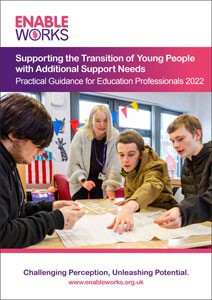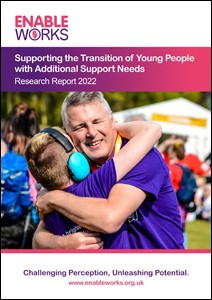Supporting the Transition of Young People with Additional Support Needs
Background
Enable Scotland set out to explore key factors relating to supporting and growing the aspirations of young people with additional support needs and disabilities. Additionally, consideration was given to the young people’s preparation and transition from school to employment.
The findings have helped establish six key recommendations to support parents and teachers to positively influence transitions. The recommendations form the basis of a guidance of good practice for educational practitioners.
Downloads
|
|
What was done?
Enable Scotland worked with parents and education practitioners to produce a research report and toolkit.
Why
The overall aims of the research were to:
- Consider what influence parents and education practitioners have on the transitions of young people with additional support needs into the world of work.
- Explore key factors relating to supporting and growing the aspirations of young people with additional support needs and disabilities, and the preparation for their transition from secondary education into employment.
- Consider influences of specific socio-economic factors e.g. gender, age, disability.
What was the impact?
Key Findings
- Parents’ relationships with their education providers are inconsistent.
- Parents want more support to understand future options and earlier access to information.
- One-fifth of parent participants (20.59%) who took part in the research live in the 15% most deprived areas of Scotland, according to Scottish Index of Multiple Deprivation (SIMD).
- 18% of participating parents identified as being disabled themselves. Parents have asked for support for themselves as well as for their child’s education transition.
- Education practitioners value the importance of parent participation in pupils’ education transition and recognise the barriers preventing some parents from being involved.
Key Recommendations
- Information about future options is needed earlier
- Employer engagement is needed earlier
- Role models are needed to inspire young people and parents
- Education practitioners would benefit from relevant bespoke training and input
- Parents need tailored support
- Ongoing support is needed after leaving school


